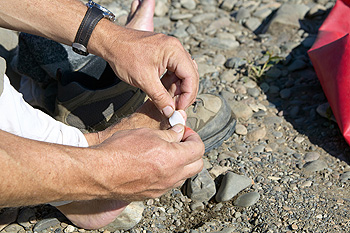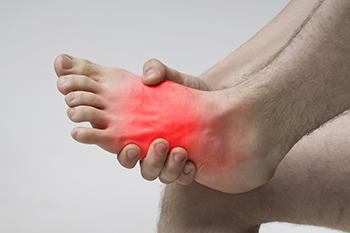
Foot blisters are a common and painful skin condition that can disrupt your daily life. These small, fluid filled sacs form as a result of friction or pressure on the skin, typically caused by ill fitting shoes, prolonged periods of walking or running, or repetitive movements. Blisters can develop on any part of the foot, but they are most commonly found on the heels, toes, and soles. The body creates blisters as a protective mechanism and the clear fluid inside serves as a cushion to shield the underlying skin from further damage. While blisters will often heal on their own, it is important to avoid popping them as this can increase the risk of infection. Instead, keep the area clean, apply a sterile dressing, and protect it from further irritation. Wearing shoes that fit properly is a preventive measure, in addition to using friction reducing creams to minimize the likelihood of foot blisters. If you have developed blisters on your feet, it is suggested that you confer with a podiatrist who can offer you additional prevention methods.
Blisters may appear as a single bubble or in a cluster. They can cause a lot of pain and may be filled with pus, blood, or watery serum. If your feet are hurting, contact one of our podiatrists of Jill Einhorn, DPM and James Einhorn, DPM. Our doctors can provide the care you need to keep you pain-free and on your feet.
Foot Blisters
Foot blisters are often the result of friction. This happens due to the constant rubbing from shoes, which can lead to pain.
What Are Foot Blisters?
A foot blister is a small fluid-filled pocket that forms on the upper-most layer of the skin. Blisters are filled with clear fluid and can lead to blood drainage or pus if the area becomes infected.
Symptoms
(Blister symptoms may vary depending on what is causing them)
Prevention & Treatment
In order to prevent blisters, you should be sure to wear comfortable shoes with socks that cushion your feet and absorb sweat. Breaking a blister open may increase your chances of developing an infection. However, if your blister breaks, you should wash the area with soap and water immediately and then apply a bandage to the affected area. If your blisters cause severe pain it is important that you call your podiatrist right away.
If you have any questions, please feel free to contact our offices located in Brooklyn and Astoria, NY . We offer the newest diagnostic and treatment technologies for all your foot care needs.

Children's feet are essential for their overall health and development. However, various foot problems can affect children as they grow. Flat feet, or pes planus, is a common condition where the arches on the inside of the feet do not develop fully, making the entire sole touch the ground. While this is normal in infants, it should resolve as they age. Ingrown toenails can cause pain, redness, and swelling, often the result of improper nail trimming or tight shoes. Proper nail care and footwear are key to preventing this issue. Sever's disease, medically termed calcaneal apophysitis, is common in active children between the ages of 8 and 14. It affects the growth plate in the heel and causes heel pain, especially during physical activities. Deformities, such as clubfoot, curly toes or overlapping toes, can be present from birth or develop later. Early intervention can help correct these deformities. Parents may wish to regularly inspect their children's feet and seek the help of a podiatrist for any of these common foot problems.
The health of a child’s feet is vital to their overall well-being. If you have any questions regarding foot health, contact one of our podiatrists of Jill Einhorn, DPM and James Einhorn, DPM. Our doctors can provide the care you need to keep you pain-free and on your feet.
Tips for Keeping Children's Feet Healthy
If you have any questions, please feel free to contact our offices located in Brooklyn and Astoria, NY . We offer the newest diagnostic and treatment technologies for all your foot care needs.

Losing a limb, particularly a lower extremity, is one of the greatest risks derived from diabetic foot ulcers. Preventing such a drastic outcome starts with undergoing an annual foot screening for those who have lost protective sensation in their feet. Next, experts believe that simple self-care techniques can allow patients to assume a certain amount of responsibility for their foot health. Knowledge of proper foot care and daily habits can go a long way in preserving limb health. This includes daily self-inspection. Regular and thorough self-examinations are critical for identifying early signs of foot injuries, calluses, or nail problems. By detecting issues such as blisters, redness, cracked skin, swelling, or abnormalities in their early stages, patients can prevent these problems from progressing into more severe conditions. Further, ill-fitting shoes that can make diabetic foot conditions worse include narrow-toed shoes, high heels, flip flops, or shoes that are too loose or tight. Timely intervention can help to prevent these issues from escalating into dire complications. If you are at risk for diabetic ulcers, it is suggested that you add a podiatrist to your medical team.
Limb salvage can be an effective way in preventing the need for limb amputation. If you have diabetes, cancer, or any other condition that could lead to foot amputation if left unchecked, consult with one of our podiatrists from Jill Einhorn, DPM and James Einhorn, DPM. Our doctors will assess your condition and provide you with quality foot and ankle treatment.
What Is Limb Salvage?
Limb salvage is the attempt of saving a limb, such as the foot from amputation. Podiatrists also try to make sure that there is enough function in the foot after the salvage that it is still usable. Diabetes is the number one cause of non-traumatic amputations in the United States. Those with diabetes experience poor blood circulation, which prevents proper healing of an ulcer. If the ulcer is left uncheck, it could become infected, which could result in the need for amputation.
However, there are other causes as well, such as cancer and traumatic injury. Links between higher mortality rates and amputation have been found. This translates into higher healthcare costs, and a reduced quality of life and mobility for amputees. Podiatrists have attempted to increase the prevalence of limb salvage in an attempt to solve these issues.
Diagnosis and Treatment
Limb salvage teams have grown in recent years that utilize a number of different treatments to save the infected limb. This includes podiatrists that specialize in wound care, rehabilitation, orthotics, and surgery. Through a combination of these methods, limb salvage has been found to be an effective treatment for infected limbs, and as an alternative to amputation. Podiatrists will first evaluate the potential for limb salvage and determine if the limb can be saved or must be amputated.
If you have any questions, please feel free to contact our offices located in Brooklyn and Astoria, NY . We offer the newest diagnostic and treatment technologies for all your foot care needs.

Extensor tendonitis is a common foot issue that causes discomfort across the top of the foot. This condition stems from irritation or inflammation of tendons that are critical for lifting the toes. Repetitive friction and pressure, often due to ill-fitting shoes, are common causes of extensor tendonitis. The primary tendons involved are the extensor hallucis longus, which lifts the big toe, and the extensor digitorum, for the other toes. Extending from lower leg muscles, these tendons cross the front of the ankle, span the upper foot, and attach to toe tips. Their limited protection renders them susceptible to injuries and leads to pain. Overuse or excessive pressure causes inflammation and swelling in these tendons. In time, this can weaken them and cause scarring that reduces flexibility and strength. Risk factors include tight shoes, prolonged weight-bearing, and calf muscle tightness. Pain from extensor tendonitis usually worsens with activity but subsides during rest. Common signs are swelling, tenderness, and bruising. If you are experiencing symptoms of extensor tendonitis, it is suggested that you make an appointment with a podiatrist for a diagnosis and the appropriate treatment options.
Foot Pain
Foot pain can be extremely painful and debilitating. If you have a foot pain, consult with one of our podiatrists from Jill Einhorn, DPM and James Einhorn, DPM. Our doctors will assess your condition and provide you with quality foot and ankle treatment.
Causes
Foot pain is a very broad condition that could be caused by one or more ailments. The most common include:
Diagnosis
To figure out the cause of foot pain, podiatrists utilize several different methods. This can range from simple visual inspections and sensation tests to X-rays and MRI scans. Prior medical history, family medical history, and any recent physical traumatic events will all be taken into consideration for a proper diagnosis.
Treatment
Treatment depends upon the cause of the foot pain. Whether it is resting, staying off the foot, or having surgery; podiatrists have a number of treatment options available for foot pain.
If you have any questions, please feel free to contact our offices located in Brooklyn and Astoria, NY . We offer the newest diagnostic and treatment technologies for all your foot care needs.